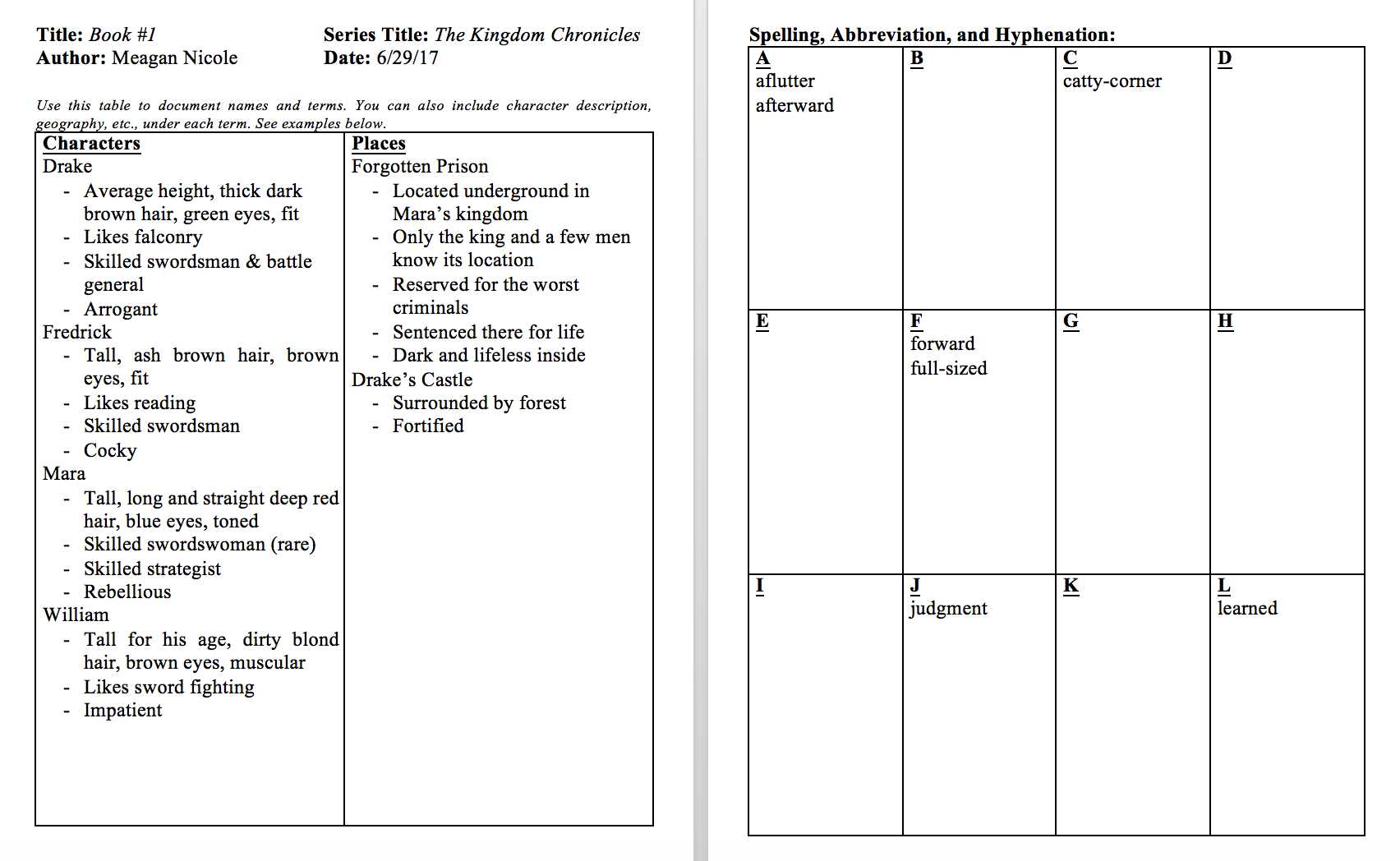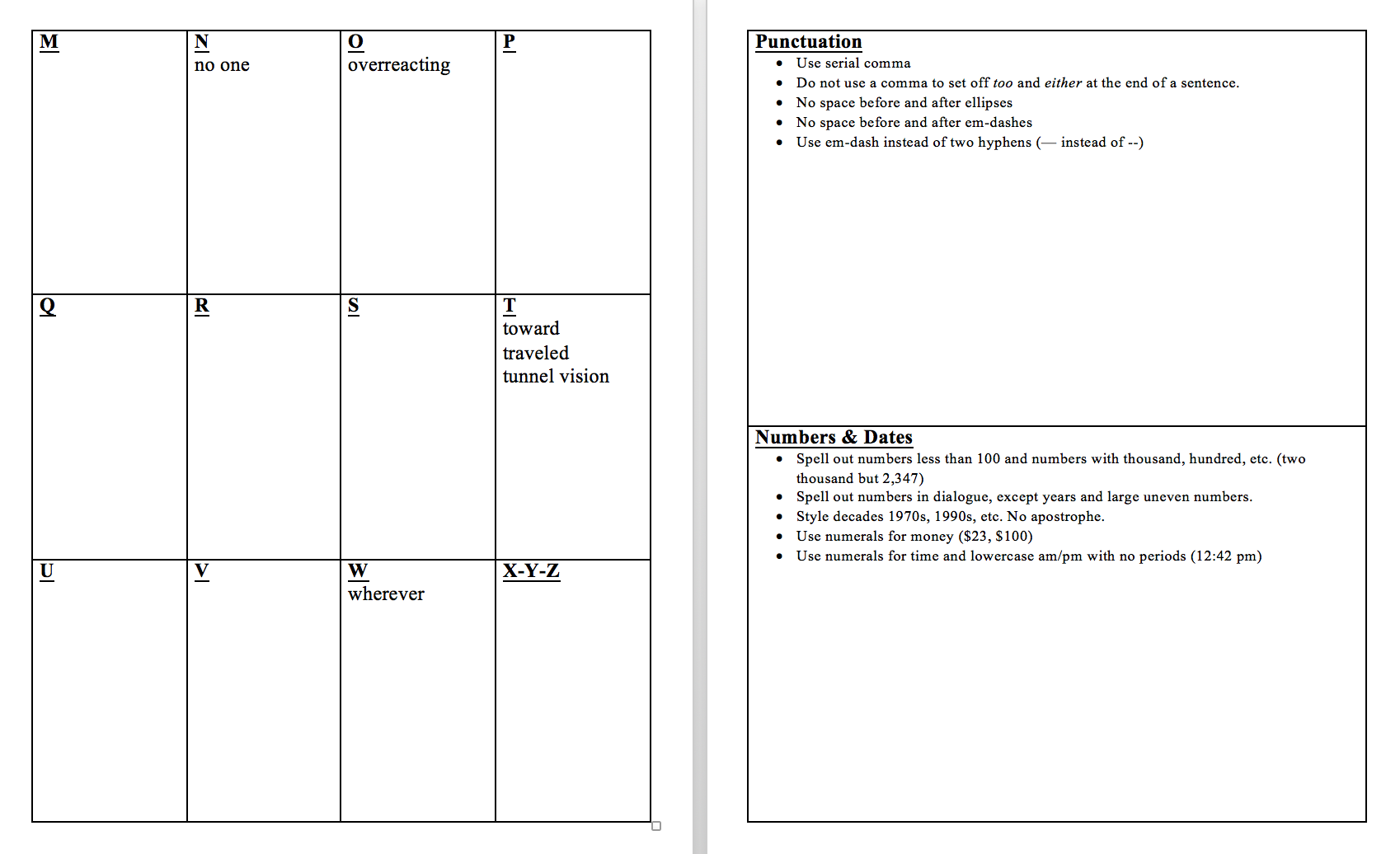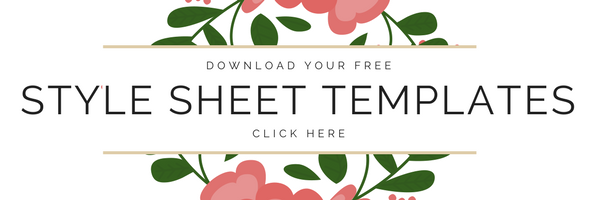Why Authors Should Use Style Sheets (Plus, Free Templates)
A lot of time and energy goes into world building for your story, especially if you write fantasy or sci-fi. You create from scratch a world that has never existed before. You create lands with exotic names and geography, and you bring creatures to life with names you designed just for them. You have specific spellings for all of those things. Spellings that cannot be changed by an editor.
For example, what if you had a land named Mora but sometimes you accidentally write Moria instead because you've been reading The Lord of the Rings? You hand your manuscript over to your editor, and he or she thinks Moria is correct. After waiting a couple of weeks, you receive your edited novel only to find that the name of your land is wrong throughout your entire 100,000 word novel.
Even if you write fiction set in the real world, you can still have words or names that you've decided to spell differently. Perhaps you want your main character's name to be Astryd, not Astrid. However, throughout your book, you accidentally alternate between the two spellings. When it comes time to hand your novel over to an editor, how will he or she know which one is correct?
There is a simple fix to all of these problems: a style sheet. Below, I'll explain what a style sheet is and how to use them. And be sure to stick around until the end because I have free style sheet templates that you can use for your novel.
What is a style sheet?
A style sheet is simply a list of all decisions related to spelling, punctuation, style, and numbers. Style sheets are most often used by editors in the traditional publishing world to keep track of all the style choices and spelling that the editor or author has made so that words like Astryd are spelled consistently throughout a manuscript.
Here is an example of a style sheet:
As you can see, it doesn't need to be fancy. It's a way to easily organize all editorial decisions in a simple list format.
Why should authors use a style sheet?
If you're familiar with style sheets, you may associate it with being the editors job to create, maintain, and then give to the author. While it is true that all good editors will provide you with a style sheet, there are a few reasons why you as the author should start the style sheet and give it to your editor.
First, keeping your own style sheet will save you time when you are writing and editing your novel. Imagine that you are on book three of your fantasy series, and your antagonist comes across a significant sword that hasn't been mentioned since book one. And you can't remember the name of it. You then have to go searching back through the first book to try to find the name of that sword. If you're lucky, it might only take a minute or two. If not, it could take you twenty minutes and cause a lot of frustration. Multiply twenty minutes by multiple searches, and you could potentially waste a lot of precious writing time.
By keeping a style sheet of all your terms, names, and spellings, you can easily reference back to your 1 - 5 page document that is organized by categories and find exactly what you are looking for in a matter of seconds.
Second, it will save you time (and maybe money) when you give your manuscript to your editor. If you give your editor a style sheet full of all the correct spellings for your magic spells and character names, your editor won't have to stop, make a note, contact you, wait for a response, and then make the changes. You can reduce the chances that your editor will choose (or miss) the wrong spelling, and you will impress and please your editor if you give him or her a style sheet. And creating a positive relationship between you and your editor from day one will really help you in the long run.
What goes on a style sheet?
1. Spelling, Capitalize, & Hyphenation
English is a tricky language, and there are so many different ways to spell, capitalize, and hyphenate different words. Is it learned or learnt? Is it full time or full-time? On a style sheet, you can keep an alphabetized list of all your spelling decisions.
This will especially help if you are an American author with a British editor or vice versa since there are some many words that are spelled slightly differently between American English and British English.
(Side note: If you don't know the correct spelling of a word, you can look it up on www.Merriam-Webster.com.)
2. Punctuation, Numbers, & Style Choices
Do you use the Oxford comma or not? Do you spell out all numbers 0 - 100 or just numbers 1 - 9? And what about italics? When do you use that?
Those are just a few things that you can record on this section of your style sheet. Now, if you don't know what sort of style choices are best for your genre, don't worry. That's where your editor comes in. It is part of the editor's job to insure that your writing adheres to the correct style. But if you're interested in learning more about style, The Chicago Manual of Style, 16th Edition is the go to style guide for books.
3. Your Created Names & Terms
Though it's last on the list, this is the most important category for you to make note of on your style sheet. Your editor will be able to document the correct spelling, punctuation, and style for your novel or short story, but you are the only one who knows how to correctly spell every land in your fantasy world or every galaxy in your sci-fi-fi universe. You should keep a running list, separated by categories and listed in alphabetical order, of all your names for characters, geography, places, and creatures and all other terms such as spells, weapons, or spaceships.
Do you want help with your style sheet?
To make this process even easier for you, I've created two different style sheet templates for you to use: fiction and nonfiction. All of them have the essential categories necessary for their genre, and I've also included a list of common style choices that you can follow. The templates are in Microsoft Word documents so that you can print them out or work with them from your computer. I've also included an additional bonus if you share it with your friends. Click below to download the templates and get your additional bonus for free.
Remember that style sheets are first designed to make the editing process easier for you. Use them as a sort of reference sheet that you can quickly search through to remind yourself how to spell that elf's name that made a brief appearance in book two of your series.
Secondly, use it as a way to help your editor ensure that your book is consistent in the spelling of all its words and style choices. This will save you the time and frustration of not having to constantly confirm with your editor that yes, you meant to write Astryd instead of Astrid and Mora instead of Moria.





